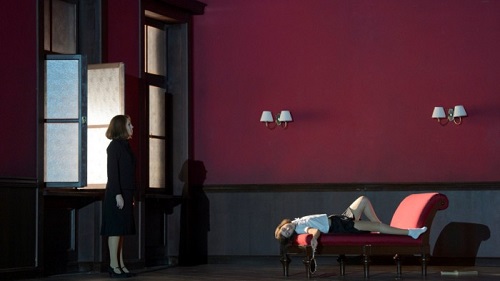 Germany Britten, The Turn of the Screw: Staatskapelle Berlin, Christopher Moulds (conductor), Berlin Schiller Theatre, 20.2.2016. (JMI)
Germany Britten, The Turn of the Screw: Staatskapelle Berlin, Christopher Moulds (conductor), Berlin Schiller Theatre, 20.2.2016. (JMI)

Production:
Berlin Staatsoper
Direction: Claus Guth
Sets and Costumes: Christian Schmidt
Lighting: Sebastian Alphons
Cast:
Governess: Emma Bell
Prologue/Peter Quint: Richard Croft
Mrs. Grose: Ann Murray
Miss Jessel: Anna Samuil
Flora: Sónia Grané
Miles: Thomas Lichtenecker
Both Le Vin Herbé and The Turn of the Screw are chamber operas that require very small orchestras. Frank Martin’s work has just seven string players and a piano, while in Benjamin Britten’s the orchestra consists of twelve musicians plus a piano. Certainly the reduced orchestra size must have been one of the main reasons to program these operas: the Staatskapelle Berlin and its director, Daniel Barenboim, are currently on tour in Japan.
This was a compelling performance of the Britten, with a clever staging and remarkable musicianship, although the vocal component was not as outstanding.
The Claus Guth production premiered here in November 2014, and is being revived for the first time. The German regisseur is one of the most imaginative around, and his works are always intriguing ̶ and controversial on occasion too. Here his vision could not be more original and well-developed. Nobody is what he or she seems or, if you prefer, what we have seen so many times. The Governess, mentally unbalanced and with significant sexual issues, is the only one who sees ghosts where none exist. For this reason, neither Peter Quint nor Miss Jessel ever appear: they sing from offstage, which emphasizes the hallucinations of the Governess. Mrs. Grose too is a strange character, rather alcoholic and with her own sexual problems. As for the two children, they are really teenagers, although the Governess views them as children. In fact, Miles is sung by a countertenor. The mentally unhinged Governess ends the play with the death of Miles at her hands, and then enjoys her dinner as the curtain falls.
The set consists of a revolving stage with the different rooms of the Bly mansion, all in red, and the action has been brought up to modern times. In short, this is an original vision by Claus Guth, and very well executed, although things occasionally are not faithful to what we are hearing.
Christopher Moulds was excellent at the podium. He maintained the tension in a reading that was well-suited to both the opera and the director’s vision. The reduced Staatskapelle Berlin gave a splendid performance.
The Governess was American soprano Emma Bell, who was a convincing interpreter on stage but less so vocally, at least for my taste. Her singing was too dramatic: I prefer a more complex and more nuanced Governess.
Mrs. Grose was interpreted by Irish veteran Ann Murray, whom I found in better voice than expected from a singer of her age (66). Her performance was impressive.
Portuguese soprano Sónia Grané, who is part of the Staatsoper roster, did well in the part of Flora. As for Miles, his interpreter was countertenor Thomas Lichtenecker, who was appropriate in the role as envisioned by Claus Guth.
The other characters are never on stage, since they are simply the hallucinations of the Governess. They were Richard Croft (who did in fact appear on stage in the Prologue), and Anna Samuil in the part of Miss Jessel. Both were very good.
The audience gave a warm welcome to the artists, and especially to Christopher Moulds.
José M. Irurzun
